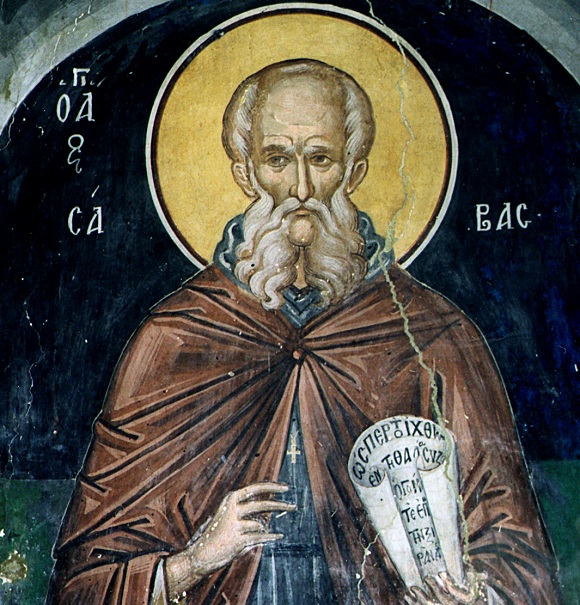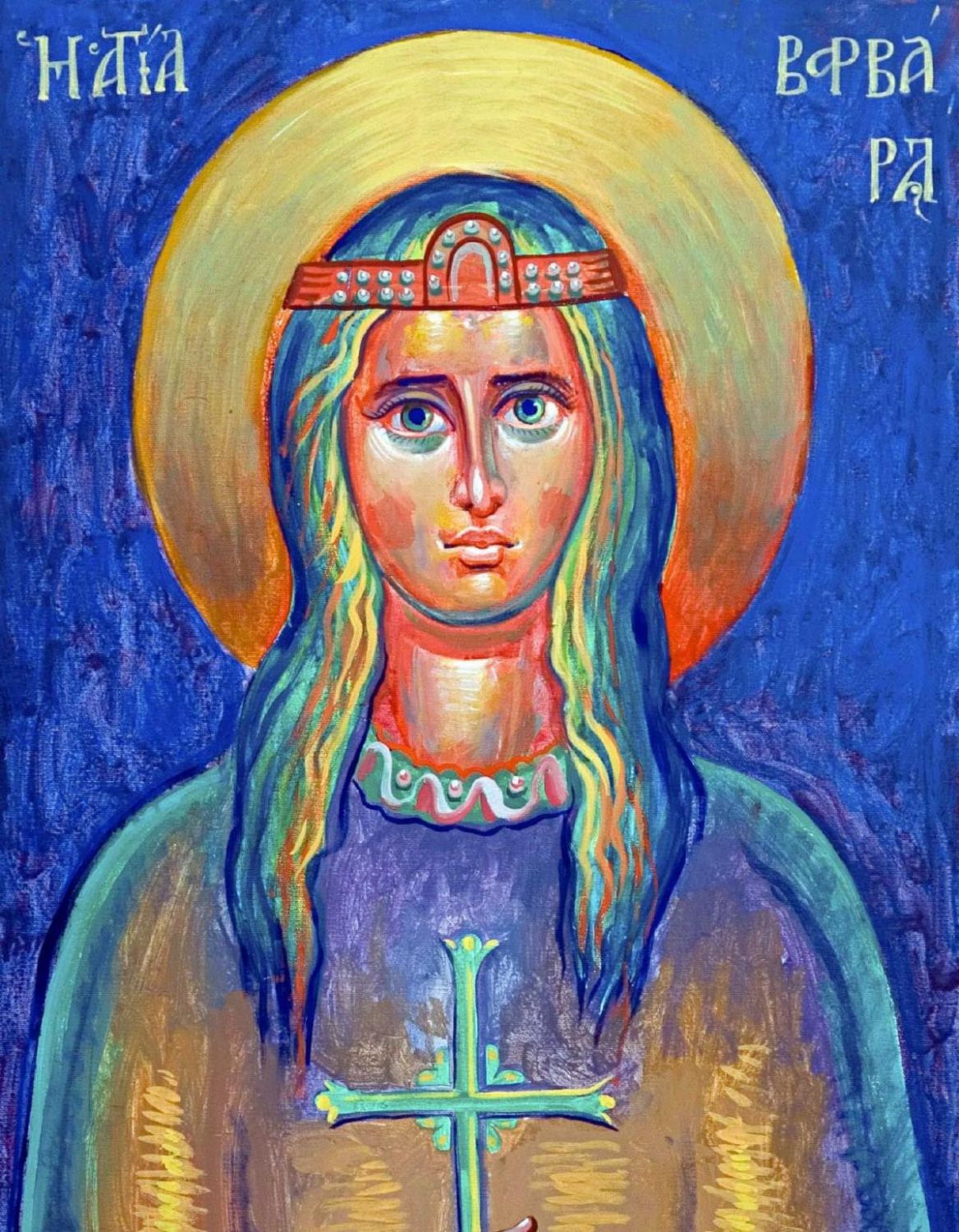Life of Saint Nicholas the Wonderworker, Archbishop of Myra
 This glorious saint, celebrated even today throughout the entire world, was the only son of his eminent and wealthy parents, Theophanes and Nona, citizens of the city of Patara in Lycia. Since he was the only son bestowed on them by God, the parents returned the gift to God by dedicating their son to Him.
This glorious saint, celebrated even today throughout the entire world, was the only son of his eminent and wealthy parents, Theophanes and Nona, citizens of the city of Patara in Lycia. Since he was the only son bestowed on them by God, the parents returned the gift to God by dedicating their son to Him.
St. Nicholas learned of the spiritual life from his uncle Nicholas, Bishop of Patara, and was tonsured a monk in the Monastery of New Zion founded by his uncle. Following the death of his parents, Nicholas distributed all his inherited goods to the poor, not keeping anything for himself. As a priest in Patara, he was known for his charity, even though he carefully concealed his charitable works, fulfilling the words of the Lord: Let not thy left hand know what thy right hand doeth (Matthew 6:3).When he gave himself over to solitude and silence, thinking to live that way until his death, a voice from on high came to him: ``Nicholas, for your ascetic labor, work among the people, if thou desirest to be crowned by Me.'' Immediately after that, by God's wondrous providence, he was chosen archbishop of the city of Myra in Lycia. Merciful, wise and fearless, Nicholas was a true shepherd to his flock.
Saint Sabbas the Sanctified
 The unknown village of Mutalaska, in the province of Cappadocia, became famous through this great luminary of the Orthodox Church. Sava was born there of his parents John and Sophia. At the age of eight, he left the home of his parents and was tonsured a monk in a nearby monastic community called Flavian's. After ten years, he moved to the monasteries of Palestine and remained longest in the Monastery of St. Euthymius the Great (January 20) and Theoctistus. The clairvoyant Euthymius prophesied of Sava that he would become a famous monk and a teacher of monks and that he would establish a lavra greater than all the lavras of that time. After the death of Euthymius, Sava withdrew to the desert, where he lived for five years as a hermit in a cave shown to him by an angel of God.
The unknown village of Mutalaska, in the province of Cappadocia, became famous through this great luminary of the Orthodox Church. Sava was born there of his parents John and Sophia. At the age of eight, he left the home of his parents and was tonsured a monk in a nearby monastic community called Flavian's. After ten years, he moved to the monasteries of Palestine and remained longest in the Monastery of St. Euthymius the Great (January 20) and Theoctistus. The clairvoyant Euthymius prophesied of Sava that he would become a famous monk and a teacher of monks and that he would establish a lavra greater than all the lavras of that time. After the death of Euthymius, Sava withdrew to the desert, where he lived for five years as a hermit in a cave shown to him by an angel of God.
The Holy Prophet Habakkuk (Abbacum)
The Holy Great-martyr Barbara and Martyr Juliana, at Heliopolis in Syria
 This glorious follower of Christ was betrothed to Christ from early childhood. Her father Dioscorus was a pagan and was renowned for his position and wealth in the city of Heliopolis in Egypt. Dioscorus locked up his only daughter Barbara, brilliant in mind and of beautiful countenance, in a high tower. He surrounded her with every comfort, gave her female servants, erected idols for worship, and built her a bathing room with two windows. Looking through the window at the earth below and the starry heavens above, Barbara’s mind was opened by the grace of God. She recognized the One True God, the Creator, despite the fact that she did not have a human teacher to bring her to this knowledge. Once, while her father was away from the city, she came down from the tower and, according to God’s providence, met some Christian women who revealed the true Faith of Christ to her. Barbara’s heart became inflamed with love for Christ the Lord. She ordered that a third window be cut open in the bath so that the three windows would represent the Holy Trinity. On one wall she traced a Cross with her finger, and the Cross etched itself deep in the stone as if cut by a chisel. A pool of water sprang forth from her footprints on the floor of the bath, which later gave healing of dis-eases to many. Learning of his daughter’s faith, Dioscorus beat her severely and drove her from the tower. He pursued her in order to kill her, but a cliff opened up and hid Barbara from her brutal father. When she appeared again, her father brought her to Martianus, the magistrate, who handed her over for torture. They stripped the innocent Barbara and flogged her until her entire body was covered with blood and wounds, but the Lord Himself appeared to her in prison with His angels and healed her. A certain woman, Juliana, upon seeing this, desired martyrdom for herself. Both women were severely tortured and with mockery were led through the city. Their breasts were cut off and much blood flowed from them. They were finally led to the place of execution, where Dioscorus himself slaughtered his daughter, and Juliana was slain by the soldiers. That same day, lightning struck the house of Dioscorus, killing him and Martianus. St. Barbara suffered in the year 306. Her miracle-working relics rest in Kiev. Glorified in the Kingdom of Christ, she has appeared many times even in our own day, sometimes alone and sometimes in the company of the Most-holy Theotokos.
This glorious follower of Christ was betrothed to Christ from early childhood. Her father Dioscorus was a pagan and was renowned for his position and wealth in the city of Heliopolis in Egypt. Dioscorus locked up his only daughter Barbara, brilliant in mind and of beautiful countenance, in a high tower. He surrounded her with every comfort, gave her female servants, erected idols for worship, and built her a bathing room with two windows. Looking through the window at the earth below and the starry heavens above, Barbara’s mind was opened by the grace of God. She recognized the One True God, the Creator, despite the fact that she did not have a human teacher to bring her to this knowledge. Once, while her father was away from the city, she came down from the tower and, according to God’s providence, met some Christian women who revealed the true Faith of Christ to her. Barbara’s heart became inflamed with love for Christ the Lord. She ordered that a third window be cut open in the bath so that the three windows would represent the Holy Trinity. On one wall she traced a Cross with her finger, and the Cross etched itself deep in the stone as if cut by a chisel. A pool of water sprang forth from her footprints on the floor of the bath, which later gave healing of dis-eases to many. Learning of his daughter’s faith, Dioscorus beat her severely and drove her from the tower. He pursued her in order to kill her, but a cliff opened up and hid Barbara from her brutal father. When she appeared again, her father brought her to Martianus, the magistrate, who handed her over for torture. They stripped the innocent Barbara and flogged her until her entire body was covered with blood and wounds, but the Lord Himself appeared to her in prison with His angels and healed her. A certain woman, Juliana, upon seeing this, desired martyrdom for herself. Both women were severely tortured and with mockery were led through the city. Their breasts were cut off and much blood flowed from them. They were finally led to the place of execution, where Dioscorus himself slaughtered his daughter, and Juliana was slain by the soldiers. That same day, lightning struck the house of Dioscorus, killing him and Martianus. St. Barbara suffered in the year 306. Her miracle-working relics rest in Kiev. Glorified in the Kingdom of Christ, she has appeared many times even in our own day, sometimes alone and sometimes in the company of the Most-holy Theotokos.
The Holy Prophet Zephaniah (Sophonias)
(December 16 / December 3)
Zephaniah was a native of Mount Sarabatha, from the tribe of Simeon. He lived and prophesied in the seventh century before Christ, at the time of Josiah the pious king of Judah. Zephaniah was a contemporary of the Prophet Jeremiah. Having great humility and a pure mind raised to God, he was found worthy of discerning the future. He prophesied the day of the wrath of God and the punishment of Gaza, Ashkalon, Ashdod, Ekron, Nineveh, Jerusalem, and Egypt. He saw Jerusalem as a filthy and polluted, … oppressing city…. Her princes within her are roaring lions; her judges are evening wolves; … her prophets are light and treacherous persons: her priests have polluted the sanctuary, they have done violence to the Law (Zephaniah 3:1-4).
Foreseeing the advent of the Messiah, he enthusiastically exclaimed: Sing, O daughter of Zion; shout, O Israel; be glad and rejoice with all thy heart, O daughter of Jerusalem (Zephaniah 3:14). This seer of mysteries entered into rest at his birthplace to await the General Resurrection and his reward from God.






